The Well-Tempered Ear
Here’s music to mark Mother’s Day
Leave a Comment
PLEASE HELP THE EAR. IF YOU LIKE A CERTAIN BLOG POST, SPREAD THE WORD. FORWARD A LINK TO IT OR, SHARE IT or TAG IT (not just “Like” it) ON FACEBOOK. Performers can use the extra exposure to draw potential audience members to an event. And you might even attract new readers and subscribers to the blog.
By Jacob Stockinger
This Sunday is Mother’s Day 2024.
The holiday celebrating mothers, grandmothers and women whose are like mothers to us is celebrated around the world in North America, South America, Europe, Asia and Africa.
Mothers have long provided inspiration to composers, performers and listeners.
The Ear’s mom loved to hear him practice and play Chopin’s Waltz in E minor and Rachmaninoff’s popular Prelude in C-sharp minor (played by the composer in the YouTube video at the bottom), which dropped out of fashion for many years but now seems back in favor, especially as an encore.
Mom was proud of her pianist son and once even let the telephone sit near the piano when I was playing the Rachmaninoff for someone who had called her long-distance and wanted to hear more of what was until then just background noise to her conversation.
Anyway, here is one of the best pieces I have seen for you to read and listen to as you celebrate Mother’s Day. Some of the music is sure to be very familiar, other music less so.
Here are 20 pieces, with brief introductions and translations, about mothers from the website Interlude in Hong Kong:
Here’s to you, Mom.
Do you have a piece to dedicate to your mom?
Did your mother have a favorite piece she liked to hear?
The Ear wants to hear.
Tags: #BlogPost, #BlogPosting, #FacebookPost, #FacebookPosting, #Mother'sDay, #UnitedStates, #YouTubevideo, 2024, Africa, alto, Amy Beach, Android, Apple, Arts, Asia, asian, audience, Bach, background, background noise, Baroque, beach, Benjamin Britten, Bing, blog, brass music, brief, Britten, Cavalleria Rusticana, celebrate, Cello, Chamber music, Charles Ives, Child, children, China, Chinese, Chopin, choral music, Christianity, church, Clara Schumann, Classical music, classicalmusic, composer, Concert, concerto, conversation, cradle, daughter, dedicate, duckduckgo, Dvorak, encore, Europe, Facebook, Family, fashion, favor, favorite, female, God, Google, Google Alert, Google Alerts, Google Search, Grainger, grandma, grandmother, hear, Holiday, Hong Kong, hymn, inspiration, inspire, interlude, introduction, IOS, Ireland, Ives, Jacob Stockinger, Johann Sebastian Bach, John Ireland, John Philip Sousa, John Tavener, Josef Suk, key, link, listener, long-distance, Love, Ludwig van Beethoven, lullaby, Madison, Mahler, march, Mary, Mascagni, matriarchal, matriarchy, Microsoft, Microsoft Bing, mom, Mother, Mother Goose, motherhood, Mothers Day, Mozart, Music, my, noise, North America, online, opera, Orchestra, Parent, Parenting, Paul Bunyan, Percy Grainger, performer, phone, Pianist, Piano, play, popular, practice, pray, Prelude, pride, proud, Puccini, Rachmaninoff, Rachmaninov, Ravel, relic, Religion, Richard Strauss, Safari, Schumann, share, singer, soing, son, Sonata, song, soprano, Sousa, South America, Strauss, Suk, Sunday, Suor Angelica, symphony, tag, Tavener, telephone, The Ear, translation, Twitter, U.S., United States, University of Wisconsin-Madison School of Music, University of Wisconsin–Madison, Viola, Violin, virgin, vocal music, Website, Well-Tempered, Well-tempered Ear, welltempered, Wisconsin, Wolfgang Amadeus Mozart, women, WordPress, Wordpress.com, world, worldwide, X, years, you, YouTube
YOU MUST HEAR THIS: No piece captures the mixed emotions of Memorial Day better than Charles Ives’ “Decoration Day”
3 Comments
PLEASE HELP THE EAR. IF YOU LIKE A CERTAIN BLOG POST, SPREAD THE WORD. FORWARD A LINK TO IT OR, SHARE IT or TAG IT (not just “Like” it) ON FACEBOOK. Performers can use the extra exposure to draw potential audience members to an event. And you might even attract new readers and subscribers to the blog.
By Jacob Stockinger
Today is Memorial Day, 2022.
It is the annual holiday to remember those who died in military service to the country. (Below are flags placed each year at the tombstones in Arlington National Cemetery in Virginia.)
If you want to honor survivors and current service members, that would be Veterans Day on Nov. 11.
All weekend long the radio has been playing music and the television has been showing war movies.
A lot of the music is familiar and repeated every year: Sousa marches and Morton Gould suites, elegies by Gustav Mahler, Samuel Barber, Aaron Copland and Leonard Bernstein; requiems by Mozart and Fauré; a hymn by John Williams and other movie scores. This year has also seen the playlist include rediscovered works of homage by African-American composers such as William Grant Still.
But only this year did The Ear finally hear — thanks to Wisconsin Public Radio — the one piece that, to his mind, best captures Memorial Day with its blending of consonance and dissonance, its mix of major and major keys, of familiar or “found” music and original music.
It is called, simply, “Decoration Day” and it was composed in 1912 — but not published until 1989 — by the 20th-century iconoclastic and early modernist American composer Charles Ives (below, 1874-1954). It ended up as part of a work the composer called “A Symphony: New England Hollidays.”
See if you agree with The Ear.
Listen to the 8-minute performance by “The President’s Own” United States Marine Band in the YouTube video at the bottom.
Listen to the deep anguish and and sense of loss conveyed in the opening, when a solemn remembrance procession goes to a cemetery to plant flags and lay flowers and wreaths to “decorate” the graves of the fallen.
Listen carefully and you will hear a faint version of “Taps” and ringing church bells in the atmospheric music.
Then as so often happens in reality, life suddenly intrudes in the form of a celebration by a loud marching brass band as it leaves the cemetery for the celebratory marches, picnics and fireworks.
But at the end, the darkness briefly returns. The sense of loss lingers long after the actual death and long after the holiday has been celebrated.
There is no closure.
Just resignation.
Just living with loss.
Here is the background from Wikipedia about how the holiday started as Decoration Day after the Civil War and when it evolved into Memorial Day in 1970: https://en.wikipedia.org/wiki/Memorial_Day
And here is biographical background, with the actual sources and depictions of “Decoration Day” — just go down the page to compositions and click — about Charles Ives: https://en.wikipedia.org/wiki/Charles_Ives
Did you know and like Charles Ives’ music?
Does “Decoration Day” impress or move you?
What music most embodies Memorial Day for you?
The Ear wants to hear.
Tags: #AaronCopland, #African-AmericanComposer, #ArlingtonNationalCemetery, #BandMusic, #BlackAmericans, #BlogPost, #BlogPosting, #BrassBand, #BrassMusic, #CharlesIves, #ChurchBells, #CivilWar, #DecorationDay, #FacebookPosting, #GabrielFaure, #GustavMahler, #JacobStockinger, #JohnPhilipSousa, #JohnWilliams, #LeonardBernstein, #MajorKey, #MemorialDay, #MilitaryService, #MinorKey, #MixedEmotions, #MortonGould, #NationalPublicRadio, #NewEngland, #OrchestralMusic, #OriginalWork, #SamuelBarber, #TheEar, #ThePresident, #TheU.S., #UnitedStates, #UnitedStatesMarineBand, #USMarines, #VeteransDay, #WarMovies, #Wikipediaentry, #WilliamGrantStill, #WisconsinPublicRadio, #WolfgangAmadeusMozart, #YouTubevideo, 20th-century, 20th-century music, Aaron Copland, actual, African American, American, American Civil War, Ameriuca, anguish, annual, Arlington, Arlington National Cemetery, Arts, atmosphere, atmospheric, audience, background, band, band music, Barber, Bernstein, biographical, black, blog, bottom, brass band, brass music, celebration, celebratory, cemetery, Charles Ives, church, church bells, Civil War, Classical music, Classical Revolution, closure, compose, composer, Composition, Concert, consonance, Copland, darkness, dead, death, Decoration Day, deep, depiction, dissonance, early, Early music, Elegy, embody, emotion, evolution, evolve, Facebook, fallen, familiar, Fascebook, Faure, film, Fireworks, flag, flower, found, Gabriel Fauré, Gould, grave, Gustav Mahler, hear, Holiday, homage, honor, hymn, iconoclast, iconoclastic, impress, information, intrude, Ives, Jacob Stockinger, John Philip Sousa, John Williams, Leonard Bernstein, life, like, linger, listen, living, loss, loud, Mahler, major key, march, Marines, mark, Memorial Day, military, minor key, minute, mixed, modern, modernist, morph, Morton Gould, move, Movies, Mozart, nation, national, National Public Radio, New England, NPR, opening, orchestral, original, performance, picnic, piece, plant, playlist, post, posting, President, procession, psalm, publish, Radio, reality, rediscover, remembrance, repeat, Samuel Barber, score, sense, service, show, solemn, soundtrack, source, sources, Sousa, Still, suddenly, Suite, symphony, Taps, Television, thanks, The Ear, TV, U.S., United State Marine Band, United States, veterans, Veterans Day, video, war, war movies, weekend, Wikipedia, William Grant Still, Williams, wisconsin public radio, Wolfgang Amadeus Mozart, work, wreaty, year, you, YouTube
Should the 1812 Overture be played this Fourth of July?
10 Comments
PLEASE HELP THE EAR. IF YOU LIKE A CERTAIN BLOG POST, SPREAD THE WORD. FORWARD A LINK TO IT OR, SHARE IT or TAG IT (not just “Like” it) ON FACEBOOK. Performers can use the extra exposure to draw potential audience members to an event. And you might even attract new readers and subscribers to the blog.
By Jacob Stockinger
The Ear recently noticed that the Wisconsin Chamber Orchestra has once again scheduled the 1812 Overture by Tchaikovsky (below) as part of the finale of its Fourth of July concert on the evening of July 6, 2022.
The performance is part of this summer’s FREE Concerts on the Square (COS) by the WCO that run on six consecutive Wednesday nights from June 29 through Aug. 3. Concerts start at 7 p.m. on the King Street corner of the Capitol Square in downtown Madison, and will be conducted by Andrew Sewell.
For more information about the series and individual performers and programs, go to: https://wcoconcerts.org/concerts-tickets/concerts-on-the-square
An asterisk says programs are subject to change.
Which got The Ear to thinking: Should Tchaikovsky’s perennial favorite, the flashy and loud 1812 Overture, be played again this year?
It is a tradition that was started on Independence Day in 1974 by Arthur Fielder and the Boston Pops, according to reputable sources.
But this year might be a very different case because of a quandary that might cause organizers, including PBS’ “A Capitol Fourth,” to rethink the program.
It is a choice that will confront many musical groups across the U.S., given the current unprovoked brutality and and war crimes being committed by Russia against Ukraine.
After all, many music groups, including the Metropolitan Opera, have already banned Russian performers who support Russian President Vladimir Putin and his unjustified war in Ukraine (below).
So here’s the question: Is it appropriate to play a favorite work celebrating a Russian military victory while Ukraine, the United States and Western allies, including NATO, are desperately trying to defeat Russian forces?
As you may recall, the overture was inspired by Russia’s victory over the invading forces of Napoleon who was attempting go conquer Russia. Like Hitler and the Nazis, Napoleon failed and the Russians prevailed. That is why, in the work, you hear the French national anthem “La Marseillaise” overcome by the chimes and cannons of the Russian victory hymn. (There was no Russian national anthem until 1815.)
Here is a link to more background in Wikipedia: https://en.wikipedia.org/wiki/1812_Overture
Will the Wisconsin Chamber Orchestra or other orchestras as well as radio and TV stations around the U.S. find a substitute piece? Perhaps it could be the Ukrainian national anthem that is performed (as in the BBC Proms concert in the YouTube video at the bottom and as many other orchestras around the world, including the Madison Symphony Orchestra and John DeMain, have done).
What else could the WCO and other groups play — especially since Sousa marches are already usually featured on The Fourth?
Do you have a suggestion?
The Ear will be interested to see how the quandary is solved — with explanations and excuses, or with alternative music?
Meanwhile, as comedian Stephen Colbert likes to say: What do you think?
Should the “1812 Overture” be played on this Fourth of July?
Why?
Or why not?
The Ear wants to hear.
Tags: #ACapitolFourth, #AdolfHitler, #AndrewSewell, #ArthurFiedler, #AudienceFavorite, #BBCProms, #BlogPost, #BlogPosting, #BostonPops, #CapitolSquare, #ChamberOrchestra, #ConcertsontheSquare, #FacebookPost, #FacebookPosting, #FourthofJuly, #FreeConcert, #IndependenceDay, #JacobStockinger, #JohnDeMain, #July4, #LaMarseillaise, #MadisonSymphonyOrchestra, #MadisonWisconsin, #MetropolitanOpera, #NapoleonicWars, #NationalAnthem, #NaziGermany, #NorthAtlanticTreatyOrganization, #PeterIlyichTchaikovsky, #RadioStation, #SocialMedia, #StephenColbert, #TheEar, #TheInternet, #TheMet, #TheU.S., #TVstation, #UnitedStates, #VladimirPutin, #WarCrimes, #WebPage, #Wikipediaentry, #WisconsinChamberOrchestra, #WorldWarII, #YouTubevideo, 1812 Overture, @1812Overture, A Capitol Fourth, Allies, alternative, America, American, Andrew Sewell, Arthur Fiedler, Arts, asterisk, audience, ban, BBC, BBC Proms, blog, Blog post, Boston Pops, brutal, brutality, cannons, Capitol, Capitol Square, celebrate, chamber orchestra, chimes, choice, Classical music, comedian, commit, composer, Concert, Concerts on the Square, conductor, confront, COS, downtown, evening, excuse, explanation, Facebook, Facebook post, favorite, finale, flashy, force, Fourth of July, France, free concert, French, Germany, group, help, Hitler, home website, hymn, Independence Day, individual, information, inspire, invasion, Jacob Stockinger, John DeMain, John Philip Sousa, July 4, justice, La Marseillaise, link, loud, Madison, Madison Symphony Orchestra, march, Metropolitan Opera, military, Music, Napoleon, Napoleonic Wars, national anthem, NATO, Nazi, North Atlantic Treaty Organization, Orchestra, organizer, PBS, perennial, performance, performer, performers, piece, play, President, program, Putin, quandary, Radio, radio station, reputable, reputation, rethink, Russia, Russian, say, schedule, series, share, singer, social media, solve, source, Sousa, Stephen Colbert, suggestion, support, symphony, tag, Tchaikovsky, Television, The Ear, the Internet, the Met, think, tradition, TV, TV station, U, U.S., Ukraine, Ukrainian, United States, unjust, unjustifiable, victory, video, war, war crimes, WCO, web, Website, Western, why, why not, Wikipedia, Wisconsin, Wisconsin Chamber Orchestra, world, World War II, YouTube
Classical music: This Saturday, Aug. 31, at 11 a.m. in Overture Hall is the last FREE Farmers’ Market organ concert of the season. On Sunday afternoon, guitarist Steven Meyer performs at the Chazen Museum of Art
Leave a Comment
IF YOU LIKE A CERTAIN BLOG POST, PLEASE SPREAD THE WORD. FORWARD A LINK TO IT OR, SHARE IT or TAG IT (not just “Like” it) ON FACEBOOK. Performers can use the extra exposure to draw potential audience members to an event. And you might even attract new readers and subscribers to the blog.
ALERT: Madison guitarist Steven Meyer will perform a FREE concert on “Sunday Afternoon Live at the Chazen” this Sunday, Sept. 1, from 12:30 to 2 p.m. in Brittingham Gallery 3. The program features music by Johann Sebastian Bach, Gustav Holst, Heitor Villa-Lobos, Fernando Sor, himself and others. Also included is music by the Beatles, jazz and folk music. For more information about the series, go to: https://www.chazen.wisc.edu/index.php?/events-calendar-demo/event/sunday-afternoon-live-at-the-chazen8/
This Sunday’s performance will, as always, be live streamed starting at 12:30. Here is a portal link for streaming: https://c.streamhoster.com/embed/media/O7sBNG/OS1C0ihJsYK/iqf1vBMs3qg_5
By Jacob Stockinger
This Saturday morning, Aug. 31, will see the last FREE Farmers’ Market organ concert of the season.
The 45-minute concert, sponsored by the Madison Symphony Orchestra and played on the Klais concert organ, takes place in Overture Hall at 11 a.m. No tickets or reservations are needed and the public is welcome.
The performer is David Ball (below), who was trained at the Juilliard School in New York City and who is based in Orange County, California, at the Christ (formerly Crystal) Cathedral.
The program features music by French composer Jean Langlais, French composer Camille Saint-Saens, German composer Max Reger, British composer Herbert Howells, Argentinean composer Norberto Guinaldo, French composer Leon Boellmann, French composer Jeanne Demessieux, contemporary American composer Alan Terricciano and American composer John Philip Sousa. (You can hear David Ball playing a different work by Herbert Howells in the YouTube video at the bottom.)
For the specific works and much more background about the performer, go to: https://madisonsymphony.org/event/free-farmers-market-concert-2019-david-ball/
Tags: #AmericanComposer, #BaroqueMusic, #BlogPost, #BlogPosting, #BritishComposer, #CamilleSaint-Saens, #ChazenMuseumofArt, #ChristCathedral, #ChristianChurch, #ClassicalGuitar, #ClassicalGuitarist, #ConcertOrgan, #CrystalCathedral, #DaneCounty, #DaneCountyFarmers'Market, #DavidBall, #FacebookPost, #FacebookPosting, #Farmers'Market, #FernandoSor, #FolkMusic, #Frenchcomposer, #GreatBritain, #GuitarMusic, #GustavHolst, #HeitorVilla-Lobos, #HerbertHowells, #HomeWebsite, #JazzMusic, #JeanLanglais, #JesusChrist, #JohannSebastianBach, #JohnPhilipSousa, #JuilliardSchool, #KlaisOrgelbau, #LeonardBernstein, #LeonBoellmann, #LiveStreaming, #LivingComposer, #MadisonSymphonyOrchestra, #MaxReger, #NewMusic, #NewYorkCity, #NorbertoGuinaldo, #OrangeCounty, #OrganMusic, #OvertureHall, #RockandRoll, #RockMusic, #SaturdayMorning, #SchoolofMusic, #StevenMeyer, #SundayAfternoonLiveattheChazen, #TheBeatles, #YouTubevideo, American, American composer, Argentina, Arts, audience, Bach, background, Baroque music, Beatles, blog, Boellmann, Britain, British, California, Camille Saint-Saëns, cathedral, Chazen Museum of Art, Christ, Christ Cathedral, Christian, church, classical guitarist, composer, Concert, contemporary, Crystal Cathedral, Dane County, Dane County Farmers' Market, David Ball, event, Facebook, farmer, Farmer's Market, Fernando Sor, folk, forward, France, free, French, Guinaldo, guitar, guitarist, Gustav Holst, Heitor Villa-Lobos, Herbert Howells, Holst, Howells, information, Jacob Stockinger, Jazz, Jean Langlais, Jesus, Jesus Christ, Johann Sebastian Bach, John Philip Sousa, Juilliard School, Klais, Langlais, Leon Boellmann, Leonard Bernstein, like, link, live streaming, Living composer, Madison, Madison Symphony Orchestra, market, Max Reger, Music, New Music, New York City, Norberto Guinaldo, Orange County, Orchestra, organ, Overture Center, Overture Hall, performance, performer, portal, post, posting, program, public, reader, reservation, rock and roll, Saint-Saens, Saturday morning, School of Music, share, Sor, Steven Meyer, subscriber, Sunday Afternoon Live at the Chazen, Sweden, Swedish, tag, ticket, United States, video, Villa-Lobos, Website, Wisconsin, YouTube
Classical music education: The 18th annual family-friendly and FREE Concert in the Park by the Wisconsin Youth Symphony Orchestras, with two student soloists, is this Wednesday night on the far west wide of Madison
1 Comment
IF YOU LIKE A CERTAIN BLOG POST, PLEASE SPREAD THE WORD. FORWARD A LINK TO IT OR, SHARE IT or TAG IT (not just “Like” it) ON FACEBOOK. Performers can use the extra exposure to draw potential audience members to an event. And you might even attract new readers and subscribers to the blog.
By Jacob Stockinger
The Wisconsin Youth Symphony Orchestras will perform its 18th annual FREE summer Concert in the Park (below) on this coming Wednesday, Aug. 7, at 1200 John Q. Hammons Drive in the Old Sauk Trails Business Park. (The rain date is this Thursday.)
Hosted by The Gialamas Company, the Concert in the Park is designed to be fun for all ages and is FREE to the public. The Ear can attest to the excellent quality of the musical performances.
Led by WYSO’s music director and Youth Orchestra conductor Kyle Knox (below), who is a graduate of the UW-Madison and the associate conductor of the Madison Symphony Orchestra, WYSO’s Youth Orchestra will perform works by Antonin Dvorak, Peter Ilyich Tchaikovsky, Modest Mussorgsky, Felix Mendelssohn, Camille Saint-Saens, John Philip Sousa and Dmitri Shostakovich.
The program includes concerto performances by two WYSO student soloists: violinist Ellen Zhou; and cellist Grace Kim.
The grounds will open at 5 p.m. for setting up lawn chairs and blankets for picnics and socializing, and for engaging in pre-concert activities, including an ice cream social (below top) and a WYSO instrument petting zoo. Also scheduled are a visit by The Big Red Reading Bus (below bottom) from the Madison Reading Project and activities by the Madison Children’s Museum.
The concert begins at 7 p.m., followed by a fireworks display.
Here is the concert program:
Slavonic Dances Nos. 1, 3, 4, 6, 8 by Antonin Dvorak
Violin Concerto by Felix Mendelssohn
- Allegro molto appassionato
Ellen Zhou, violin (below)
Cello Concerto No. 1 in A minor, Op. 33, by Camille Saint-Saens
III. Tempo primo
Grace Kim, cello (below)
Symphony No. 4 in F minor, Op. 36, by Peter Ilyich Tchaikovsky
- Finale: Allegro con fuoco
Intermission
“Tahiti Trot” (Tea for Two) by Dmitri Shostakovich (orchestrated by Dave Brubeck and heard in the YouTube video at the bottom)
“Stars and Stripes Forever” March by John Philip Sousa (orchestrated by Leopold Stokowski)
“Pictures at an Exhibition” by Modest Mussorgsky (orchestrated by Maurice Ravel)
1st Promenade
Gnomus
2nd Promenade
4th Promenade
Ballet of Unhatched Chicks
The Hut on Hen’s Legs (Baba Yaga)
The Great Gate of Kiev
For more information, food and beverage menus, and information about how to reserve tables, call (608) 836-8000 or visit www.Gialamas.com (click on Events) or email office@Gialamas.com
For more information about WYSO, including how to join it, support it, learn about its background and attend future events, go to https://www.wysomusic.org
Tags: #AntoninDvorak, #BigRedReadingBus, #BlogPost, #BlogPosting, #BusinessPark, #CamilleSaint-Saens, #CelloConcerto, #ConcertinthePark, #ConcertProgram, #DaveBrubeck, #DmitriShostakovich, #EllenZhou, #FacebookPost, #FacebookPosting, #FamilyFriendly, #FelixMendelssohn, #FolkDance, #FolkMusic, #GialamasCompany, #GraceKim, #GreatGateofKIev, #HomeWebsite, #IceCream, #IceCreamSocial, #JohnPhilipSousa, #JohnQ.HammonsDrive, #KyleKnox, #LeopoldStokowski, #MadisonChildren'sMuseum, #MadisonReadingProject, #MadisonSymphonyOrchestra, #MauriceRavel, #MeadWitterSchoolofMusic, #ModestMussorgsky, #MusicalPerformance, #MusicDirector, #MusicEducation, #OldSaukTrailsBusinessPark, #OrchestralArrangement, #PeterIlyichTchaikovsky, #PettingZoo, #PicnicDinner, #PicturesatanExhibition, #RainDate, #SlavonicDances, #SouthKorea, #StarsandStripesForever, #TahitiTrot, #TeaforTwo, #TheEar, #Thursdaynight, #UniversityofWisconsin-Madison, #ViolinConcerto, #Wednesdayafternoon, #WisconsinYouthSymphonyOrchestras, #WYSOconcerts, #YoungPeople, #YouthOrchestra, #YouTubevideo, activities, age, allegro, American, Antonín Dvořák, Arts, asian, attend, background, ballet, beverage, Big Red Reading Bus, blog, bus, Business, business park, Camille Saint-Saëns, celiist, Cello, Cello Concerto, chicks, children, children's concerts, China, Chinese, Classical music, composer, Concert, Concert in the Park, concert program, concerto, conductor, dance, Dave Brubeck, display, Dmitri Shostakovich, drink, Ellen Zhou, email, engage, evening, event, excellent, Facebook, Family, family-friendly, Felix Mendelssohn, finale, Fireworks, Folk music, food, forward, free, friend, fun, funding, future, Gialamas Company, Grace Kim, Great Gate of Kiev, grounds, hen, host, hut, ice cream, ice cream social, information, instrument, Jacob Stockinger, John Philip Sousa, John Q. Hammons Drive, join, kids, Korea, Korean, Kyle Knox, learn, Leopold Stokowski, like, link, Madison, Madison Children's Museum, Madison Reading Project, Madison Symphony Orchestra, march, Maurice Ravel, Mead Witter School of Music, menu, Modest Mussorgsky, Music, Music director, Music education, musical, Old Sauk Trails, open, Orchestra, orchestral arrangement, orchestrated, Park, perform, performance, pet, Peter Ilyich Tchaikovsky, petting zoo, picnic, Pictures at an Exhibition, post, posting, program, promenade, public, quality, rain, rain date, reserve, share, Slavonic Dances, social, socialize, socializing, soloist, South Korea, sponsor, Stars and Stripes Forever, Student, support, symphony, table, tag, Tahiti Trot, Tea for Two, Tempo, The Ear, Thursday, United States, University of Wisconsin-Madison School of Music, University of Wisconsin–Madison, Violin, Violin concerto, violinist, visit, Website, Wednesday, Wisconsin, Wisconsin Youth Symphony Orchestras, works, WYSO, young, Youth Orchestra, YouTube, zoo
Classical music: Today is the Fourth of July. Here is patriotic music to help celebrate, including a portrait of a truly presidential president for the purpose of comparison
5 Comments
IF YOU LIKE A CERTAIN BLOG POST, PLEASE SPREAD THE WORD. FORWARD A LINK TO IT OR, SHARE IT or TAG IT (not just “Like” it) ON FACEBOOK. Performers can use the extra exposure to draw potential audience members to an event. And you might even attract new readers and subscribers to the blog.
By Jacob Stockinger
Today is the Fourth of July – a celebration of Independence Day when the United States officially declared its separation from Great Britain in 1776.
The day will be marked by picnics and barbecues, by local parades and spectacular fireworks – and this year by armored tanks and fighter jets in yet another expensive display of military power by You Know Who: that loudmouth man who overcompensates for dodging the draft by acting more like King George than George Washington.
The “Salute to America” sure looks like it is really going to be a “Salute to Trump.”
But whatever your politics, your preferences in presidents or the festive activities you have planned for today, there is classical music to help you mark and celebrate the occasion. Just go to Google and search for “classical music for the Fourth of July.”
Better yet, tune into Wisconsin Public Radio, which will be featuring American classical music all day long.
In addition, though, here are some oddities and well-known works that The Ear particularly likes and wants to share.
The first is the Russian immigrant composer and virtuoso pianist Sergei Rachmaninoff playing his own version of our national anthem, “The Star-Spangled Banner,” something he apparently did out of respect for his adopted country before each recital he played in the U.S.:
And the second is by another Russian immigrant and piano virtuoso, Vladimir Horowitz, who was a friend and colleague of Rachmaninoff. Here he is playing his piano arrangement, full of keyboard fireworks that sound much like a third hand playing, of “The Stars and Stripes Forever” by American march king John Philip Sousa. Horowitz used the patriotic march to raise money and sell war bonds during World War II, then later used as an encore, which never failed to wow the audience:
For purposes of artistic and political comparisons of presidents, you will also find Aaron Copland’s “A Lincoln Portrait” – with famous actor and movie star Henry Fonda as the narrator of Honest Abe’s own extraordinary oratory and understated writing — in the YouTube video at the bottom.
And in a ironic twist The Ear can’t resist, here are nine pieces — many orchestral and some choral –chosen by the official website of the BBC Music Magazine in the United Kingdom to mark and honor American Independence Day. It has some surprises and is worth checking out:
http://www.classical-music.com/article/nine-best-works-independence-day
If you like or favor other works appropriate to the Fourth of July or have comments, just leave word and a YouTube link if possible, in the Comment section.
The Ear wants to hear.
Tags: #AaronCopland, #AbrahamLincoln, #AdoptedCountry, #ALincolnPortrait, #AmericanMusic, #AmericanPatriotism, #BBCMusicMagazine, #BlogPost, #BlogPosting, #CharlesIves, #CheckOut, #ChoralMusic, #DonaldJ.Trump, #EuropeanImmigration, #FacebookPost, #FacebookPosting, #FighterPlane, #FightJet, #FourthofJuly, #GeorgeWashington, #Googlesearch, #GreatBritain, #HenryFonda, #HonestAbe, #IndependenceDay, #JetPlane, #JoanTower, #JohnPhilipSousa, #KingGeorge, #LeonardBernstein, #MarchKing, #MilitaryPower, #MovieStar, #NationalAnthem, #OrchestralMusic, #PIanoRecital, #PresidentTrump, #SalutetoAmerica, #SergeiRachmaninoff, #SergeiRachmaninov, #Star-SpangledBanner, #StatueofLiberty, #TheEar, #TheStarsandStripesForever, #TheU.S., #UnitedKingdom, #UnitedStates, #VirtuosoPianist, #VladimirHorowitz, #WarBonds, #WisconsinPublicRadio, #WorldWarll, #YouKnowWho, #YouTubevideo, A Lincoln Portrait, Aaron Copland, Abraham Lincoln, act, activities, Actor, adopt, adopted, airplane, American, anthem, armor, armored, arrangement, artistic, Arts, audience, barbecue, BBC, BBC Music Magazine, blog, celebrate, celebration, Charles Ives, check out, choral music, Classical music, classicalmusic, colleague, comment, comparison, composer, Concert, country, declare, display, dodging, Donald Trump, draft, encore, expensive, extraordinary, Facebook, famous, favor, festive, fight, Fireworks, flag, forward, Fourth of July, friend, George Washington, Google, Great Britain, hand, Henry Fonda, Honest Abe, honor, immigrant, immigration, Independence Day, ironic, irony, Jacob Stockinger, jet, Joan Tower, John Philip Sousa, King, King George, Leonard Bernstein, like, link, local, loudmouth, Madison, man, march, march king, military, military power, money, movie, movie star, Music, narrator, national anthem, occasion, oddities, official, oratory, Orchestra, orchestral, overcompensate, parade, patriotic, patriotism, performer, Pianist, Piano, picnic, plane, Politics, power, preference, President, President Donald Trump, President Trump, presidential, reader, recital, respect, Russian, salute, Salute to America, section, separation, Sergei Rachmaninoff, Sergei Rachmaninov, share, spectacular, star, Star-Spangled Banner, Statue of Liberty, subscriber, surprise, symphony, tag, tanks, The Ear, The Stars and Stripes Forever, The U.S., today, truly, Trump, twist, U.K., understate, understated, United Kingdom, United States, version, virtuoso, Vladimir Horowitz, war bonds, well-known, Wisconsin, wisconsin public radio, work, World War ll, worth, wow, writing, you know who, YouTube
Classical music: Today is Memorial Day – a good time to remember the civilian dead as well as the military dead. The Ear likes Ravel’s “Le Tombeau de Couperin.” What music would you listen to to mark the holiday?
2 Comments
IF YOU LIKE A CERTAIN BLOG POST, PLEASE SPREAD THE WORD. FORWARD A LINK TO IT OR, SHARE or TAG IT (not just “Like” it) ON FACEBOOK. Performers can use the extra exposure to draw potential audience members to an event.
By Jacob Stockinger
Today is Memorial Day, 2019, when the nation honors the men and women who died in military service. The Ear would like to see much more attention and remembrance paid to the huge number of civilians — much higher than military personnel and soldiers — who have died in wars and military service, whose lives weren’t given but taken.
In fact, why not establish and celebrate a separate holiday to honor civilian deaths in war? Perhaps it would help to know the detailed history and background of the holiday, since it is not as straightforward or modern as you might expect:
https://en.wikipedia.org/wiki/Memorial_Day
What piece of classical music would you listen to in order to mark the holiday?
There is a lot to choose from.
The Ear especially likes “Le Tombeau de Couperin” by the early 20th-century French composer Maurice Ravel. It is a “tombeau” – a metaphorical “tomb” or “grave” used by the French to mean paying homage to the dead – in two senses.
Its neo-Classical or neo-Baroque style recalls the 18th-century world of French composers and harpsichordists including Jean-Philippe Rameau and Francois Couperin. But in a second sense, Ravel (below, in 1910) dedicated each of the six movements to a friend – in one case, two brothers — who had died during World War I. So part of its appeal is that it is a very personal statement of grief.
Here is more detailed background about the piece:
https://en.wikipedia.org/wiki/Le_tombeau_de_Couperin
The work was orchestrated later, which added sonic color but cut out two movements. The Ear prefers the original piano version, which seems a little more percussive, austere and straightforward — less pretty but more beautiful, and more in keeping with the holiday by evoking sentiment without sentimentality.
In the YouTube video at the bottom, you can hear it in a live performance by Canadian pianist Angela Hewitt.
But there are lots of other works to choose from by many composers: John Adams (“The Wound Dresser” after poetry of Walt Whitman); Samuel Barber (Adagio for Strings); Ludwig van Beethoven (slow movements of Symphonies 3 and 7, and of the Piano Sonata Op. 26); Johannes Brahms (“A German Requiem”); Benjamin Britten (War Requiem); Frederic Chopin (Funeral March from Sonata No. 2, polonaises, preludes and the “Revolutionary” Etude); Aaron Copland (“Fanfare for the Common Man” and “Letter From Home”); Edward Elgar (“Nimrod” from “Enigma Variations”); Gabriel Faure (Requiem and Elegy for cello); Franz Joseph Haydn (“Mass in Time of War”); Paul Hindemith (“When Lilacs Last in the Dooryard Bloom’d – A Requiem for Those We Love”); Charles Ives (Variations on “America” and “Decoration Day”); Henry Purcell (“When I Am Laid in Earth”); John Philip Sousa (“Honored Dead” March); Ralph Vaughan Williams (Symphony No. 3 “Pastoral”); and many others, including Johann Sebastian Bach and Wolfgang Amadeus Mozart.
Here is a list from the British radio station Classical FM:
Here is a list of patriotic music from Nashville Public Radio:
Here is another list from an American source:
http://midamerica-music.com/blog/five-classical-works-memorial-day/
Here are more sound samples from NPR:
https://www.npr.org/templates/story/story.php?storyId=104341851
And here is another one from Northwest Public Radio:
https://www.nwpb.org/2015/05/22/memorial-day-music-commemorate-celebrate/
What do you think of a holiday commemorating civilian deaths in war?
What favorite piece of classical music would you play and listen to as you mark Memorial Day?
Let us know, with a YouTube link if possible, in the COMMENT section.
The Ear wants to hear.
Tags: #18thCentury, #20thCentury, #AaronCopland, #AdagioforStrings, #AmericanPatriotism, #AngelaHewitt, #BaroqueComposer, #BaroqueEra, #BaroqueMusic, #BenjaminBritten, #BlogPost, #BlogPosting, #ChamberMusic, #CharlesIves, #ChoralMusic, #Classicalera, #ClassicalStyle, #DecorationDay, #EdwardElgar, #FacebookPost, #FacebookPosting, #FanfarefortheComonMan, #FrancoisCouperin, #FranzJosephHaydn, #FredericChopin, #Frenchcomposer, #FrenchHarpsichord, #FrenchMusic, #FuneralMarch, #GabrielFaure, #HenryPurcell, #IraqWar, #Jean-PhilippeRameau, #JohannesBrahms, #JohannSebastianBach, #JohnAdams, #JohnPhilipSousa, #KoreanWar, #LeTombeaudeCouperin, #LudwigVanBeethoven, #MauriceRavel, #MemorialDay, #NashvilleTennessee, #NationalPublicRadio, #NimrodVariation, #PatrioticMusic, #PaulHindemith, #PianoMusic, #PianoSonata, #PublicRadio, #RalphVaughanWilliams, #SamuelBarber, #TheCivilWar, #TheEar, #ThemeAndVariations, #VietnamWar, #VocalMusic, #WaltWhitman, #WarDead, #WarRequiem, #Wikipediaentry, #WolfgangAmadeusMozart, #WorldWarI, #WorldWarII, #YouTubevideo, 18th century, 20th-century, Aaron Copland, Adagio for Strings, Afghanistan, American, Angela Hewitt, appeal, Arts, attention, audience, austere, Bach, background, Baroque, Beethoven, Benjamin Britten, blog, British, brother, Canada, Canadian, Cello, Chamber music, Charles Ives, choral music, Civil War, civilian, Classical, color, Compact Disc, composer, dead, Decoration Day, die, Early music, Earth, Edward Elgar, Elegy, evoking, Facebook, Fanfare, Fanfare for the Common Man, flag, FM, forward, François Couperin, Franz Joseph Haydn, Frédéric Chopin, French, friend, funeral march, Gabriel Fauré, give, given, grave, grief, harpsichord, Henry Purcell, History, Holiday, homage, Home, honor, Iraq, Iraq war, Jacob Stockinger, Jean-Philippe Rameau, Johann Sebastian Bach, Johannes Brahms, John Adams, John Philip Sousa, Korean War, Le tombeau de Couperin, letter, like, link, Love, Ludwig van Beethoven, lyrics, Madison, mass, Maurice Ravel, memorial, Memorial Day, military, modern, movement, Mozart, Music, Nashville, Nimrod, northwest, NPR, opera, Orchestra, orchestrate, original, other, part, pastoral, Pastoral Symphony, PastoralSymphony, patriot, patriotic music, patriotism, Paul Hindemith, percussive, performer, personal, Piano, Piano sonata, Poetry, polonaise, Prelude, public radio, Radio, Ralph Vaughan Williams, remember, remembrance, Requiem, Samuel Barber, sentiment, sentimentality, service, share, Sonata, sonic, source, statement, style, symphony, tag, take, taken, The Ear, theme and variations, today, tomb, UK, United States, variations, Vietnam War, Violin, vocal music, war dead, War Requiem, we, Website, Wikipedia, Wisconsin, wisconsin public radio, Wolfgang Amadeus Mozart, works, World War I, World War II, YouTube
Classical music: The world premiere of John Harbison’s Sonata for Viola and Piano this Sunday night headlines a busy weekend at the UW that includes wind music and band music
2 Comments
IF YOU LIKE A CERTAIN BLOG POST, PLEASE SPREAD THE WORD. FORWARD A LINK TO IT OR, SHARE or TAG IT (not just “Like” it) ON FACEBOOK. Performers can use the extra exposure to draw potential audience members to an event
By Jacob Stockinger
This is a big and busy weekend at the University of Wisconsin-Madison’s Mead Witter School of Music.
The most publicized event this week, justifiably, is the world premiere of a new Sonata for Viola and Piano by composer John Harbison, who has won many awards and honors including a Pulitzer Prize and a MacArthur “genius” Fellowship. The guest pianist, from Minnesota, is Timothy Lovelace.
The premiere takes place in Mills Hall on Sunday night at 7:30 p.m. The Pro Arte Quartet will also play the “Sunrise” Quartet by Franz Joseph Haydn and “Four Encores for Stan” by Harbison. Pro Arte violist Sally Chisholm (below, in a photo by Rick Langer) will perform the new work that was written for her. It was commissioned by an anonymous patron to mark the composer’s 80th birthday.
For more information about the concert, the piece and tickets, go to: https://www.music.wisc.edu/2018/12/17/world-premiere-of-john-harbisons-viola-sonata/
In addition, Harbison (below) will give a free and public master class on Monday, Feb. 18, from noon to 1:30 p.m. in the Mills Music Library Seminar Room (Room B162G in the Memorial Library).
But that is far from the only important or noteworthy event going on.
Here is a day-by-day schedule, not including the concert by the Wisconsin Youth Symphony Orchestras’ Youth Orchestra with guest clarinetist Amitai Vardi that takes place TODAY in Mills Hall at 4 p.m. Here is a link to more about the WYSO concert:
TODAY
At 3 p.m. in Morphy Hall, the winners’ FREE concert of the Irving Shain Woodwind-Piano Duo Competition will take place. To see the four winners and their complete programs, go to: https://www.music.wisc.edu/event/irving-shain-woodwind-piano-duo-competition-winners-recital-2/
At 7:30 p.m., faculty member bassoonist Marc Vallon (below, in a photo by James Gill), who plays with the Wingra Wind Quintet, and friends will give a FREE concert. Music to be performed includes works by Robert Schumann, John Harbison, Ida Gotkowsky, Emmanuel Chabrier, Georges Bizet, Jules Massenet and Marc Vallon, although specific titles are not listed. For more information, go to: https://www.music.wisc.edu/event/faculty-recital-marc-vallon-bassoon-2/
SUNDAY
At 2 p.m. in Mills Hall, a FREE concert will be the inaugural Wind Ensemble Concerto Competition and its winner Midori Samson (below). Scott Teeple is the faculty conductor, and Cole Hairston and Ross Wolf are graduate student conductors. The concert will be STREAMED LIVE. Here is a link to the streaming portal, which also has an archive of other streamed concerts: https://www.music.wisc.edu/video/
At 4 p.m. in Mills Hall, the UW Concert Band will perform a FREE concert under the baton of its retiring director Mike Leckrone (below).
The program, subject to change, include: “Nessum Dorma” by Giacomo Puccini; “Universal Judgment” by Camille de Nardis; “Psalm for Band” by Vincent Persichetti; “La Boutique Fantastique” by Gioacchino Rossini, arranged by Ottorino Respighi; and “Nobles of the Mystic Shrine” by John Philip Sousa.
Here is a link to the program: https://www.music.wisc.edu/event/uw-concert-band/
Tags: #AmitaiVardi, #BandMusic, #BlogPost, #BlogPosting, #CamilledeNardis, #ClarinetConcerto, #ConcertBand, #ConcertoCompetition, #EmmanuelChabrier, #FacebookPost, #FacebookPosting, #FacultyMember, #FranzJosephHaydn, #GeorgesBizet, #GiacomoPuccini, #GioachinoRossini, #GuestArtist, #IdaGotkowsky, #IrvingShain, #JohnHarbison, #JohnPhilipSousa, #JulesMassenet, #LiveStreaming, #MacArthurFellow, #MarcVallon, #MeadWitterSchoolofMusic, #MemorialLibrary, #MidoriSamson, #MikeLeckrone, #MillsMusicLibrary, #MusicEducation, #NessumDorma, #NewMusic, #OttorinoRespighi, #ProArteQuartet, #RobertSchumann, #SallyChisholm, #SunriseQuartet, #TimothyLovelace, #UniversityofWisconsin-Madison, #UWConcertBand, #VincentPersichetti, #WingraWindQuintet, #WisconsinYouthSymphonyOrchestras, #WoodwindInstruments, #WoodwindMusic, #WorldPremiere, admission, Amitai Vardi, anonymous, archive, Arts, audience, band, band music, Bassoon, birthday, blog, Camille de Nardis, Chamber music, clarine concerto, Classical music, commission, composer, Concert, Concert Band, concerto, concerto competition, conductor, donor, duo, Emmanuel Chabrier, event, Facebook, faculty member, fellowship, Franz Joseph Haydn, free, fund, genius, Georges Bizet, Giacomo Puccini, gues, guest artist, Ida Gotkowsky, important, information, Irving Shain, Jacob Stockinger, John Harbison, John Philip Sousa, Jules Massenet, library, like, link, live streaming, live-stream, livestream, Livestreamed, Lovelace, MacArthur Fellow, Madison, Madison Symphony Orchestra, Marc Vallon, master class, masterclass, Mead Witter School of Music, Memorial Library, Midori Samson, Mike Leckrone, Mills Music Library, Minnesota, Music, Music education, Nessum Dorma, New Music, noteworthy, Orchestra, patron, performer, Pianist, Piano, portal, post, posting, Pro Arte Qartet, program, psalm, public, Pulitzer Prize, Respighi, Robert Schumann, Rossini, Sally Chisholm, Sunrise Quartet, symphony, tag, ticket, title, today, United States, University of Wisconsin-Madison School of Music, University of Wisconsin–Madison, UW Concert Band, Vincent Persichetti, Viola, Violin, Wings Wind Quartet, winner, Wisconsin Youth Symphony Orchestras, woodwind, works, world premiere, YouTube
Classical music: Today is the Fourth of July. Independence Day is the right time to celebrate American classical composers and patriotic concert music. Here are three ways to do that
7 Comments
By Jacob Stockinger
Today is the Fourth of July – Independence Day.
That makes it exactly the right time to think about American composers and American patriotic music – both of which have been receiving well-deserved airplay all week on Wisconsin Public Radio.
Here are three items that seem appropriate because they pertain to American composers and American classical music.
ITEM 1
Tonight at 7 p.m. on the King Street corner of the Capital Square in downtown Madison, guest conductor Huw Edwards (below) will lead the Wisconsin Chamber Orchestra in its Concert on the Square for the Fourth of July.
The “American Salute” program includes: “American Salute” by Morton Gould; the Overture to “Candide” by Leonard Bernstein; “Wisconsin Forward Forever” by march king John Philip Sousa; and, of course, “The 1812 Overture” by Peter Ilyich Tchaikovsky.
Blankets can go down on the ground starting at 3 p.m. For more general information about attending the concert including weather updates, rules and etiquette, and food caterers and vendors, go to:
https://wisconsinchamberorchestra.org/performances/concerts-on-the-square-2-2/
ITEM 2
Can you name 30 American classical composers? The Ear tried and it’s not easy.
But thanks to Capital Public Radio in Sacramento, California – which will also play and stream (click on the Listen tab) such music today — it isn’t hard.
Here is a link:
You can click on the link “Playlist for Independence Day” and see the photo of the composers and the titles of compositions that will be played.
You can also click on the composer’s name in the alphabetized list and see a biography in Wikipedia.
Can you think of American composers who didn’t make the list? Leave the name or names – Henry Cowell and Virgil Thomson (below) come to mind — in the COMMENT section.
The Ear wants to hear.
ITEM 3
Finally, given the controversial political issues of the day surrounding immigration, The Ear offers this take on perhaps the most virtuosic piano transcription of patriotic music ever played.
It was done by someone who immigrated permanently to the U.S. in 1939 and then became a naturalized citizen in 1944. He also raised millions through war bonds during World War II.
He was the Russian-born pianist Vladimir Horowitz, here playing his own celebrated virtuoso arrangement – done in 1945 for a patriotic rally and war bonds concert in Central Park — of ”The Stars and Stripes Forever” by John Philip Sousa.
Here is a link to his biography in Wikipedia:
https://en.wikipedia.org/wiki/Vladimir_Horowitz
And here is the YouTube audio of his own performance of the Sousa piece, with the score, including all the special technical demands, especially lots of Horowitz’s famous octaves, to follow along with. It’s a performance that has become justifiably legendary:
Tags: #AmericanCitizen, #Americancomposers, #AmericanMusic, #AmericanSalute, #CentralPark, #ConcertsontheSquare, #FoodCaterer, #FoodVendor, #FourthofJuly, #HenryCowell, #HuwEdwards, #IndependenceDay, #JohnPhilipSousa, #LeonardBernstein, #MortonGould, #NaturalizedCitizen, #OrchestraConductor, #PatrioticMusic, #PeterIlyichTchaikovsky, #PoliticalControversy, #PublicRadio, #StarandStripesForever, #StateCapitol, #VirgilThomson, #VladimirHorowitz, #Wikipediaentry, #WisconsinChamberOrchestra, #WisconsinPublicRadio, @1812Overture, American, Arts, biography, California, Candide, caterer, Cello, Chamber music, choral music, citizen, Classical music, composer, composers, conductor, controversy, demands, etiquette, food, Fourth of July, guest, Henry Cowell, Hew Edwards, Horowitz, immigration, Independence Day, Jacob Stockinger, John Philip Sousa, listen, Madison, march, Morton Gould, Music, New York City, octave, Overture to Candide, patriotic, patriotic music, patriotism, Pianist, Piano, playlist, Politics, program, public radio, rule, Sacramento, score, Sousa, Stars and Stripes Forever, symphony, Tchaikovsky, technical, technique, University of Wisconsin-Madison School of Music, University of Wisconsin–Madison, vendor, Viola, Violin, Virgil Thomson, vocal music, weather, Website, Wikipedia, Wisconsin, Wisconsin Chamber Orchestra, wisconsin public radio, Wisconsin State Capitol, YouTube
- June 2024
- May 2024
- April 2024
- March 2024
- February 2024
- January 2024
- December 2023
- November 2023
- October 2023
- September 2023
- August 2023
- July 2023
- June 2023
- May 2023
- April 2023
- March 2023
- February 2023
- January 2023
- December 2022
- October 2022
- September 2022
- June 2022
- May 2022
- April 2022
- March 2022
- July 2021
- June 2021
- May 2021
- April 2021
- March 2021
- February 2021
- January 2021
- December 2020
- November 2020
- October 2020
- September 2020
- August 2020
- July 2020
- June 2020
- May 2020
- April 2020
- March 2020
- February 2020
- January 2020
- December 2019
- November 2019
- October 2019
- September 2019
- August 2019
- July 2019
- June 2019
- May 2019
- April 2019
- March 2019
- February 2019
- January 2019
- December 2018
- November 2018
- October 2018
- September 2018
- August 2018
- July 2018
- June 2018
- May 2018
- April 2018
- March 2018
- February 2018
- January 2018
- December 2017
- November 2017
- October 2017
- September 2017
- August 2017
- July 2017
- June 2017
- May 2017
- April 2017
- March 2017
- February 2017
- January 2017
- December 2016
- November 2016
- October 2016
- September 2016
- August 2016
- July 2016
- June 2016
- May 2016
- April 2016
- March 2016
- February 2016
- January 2016
- December 2015
- November 2015
- October 2015
- September 2015
- August 2015
- July 2015
- June 2015
- May 2015
- April 2015
- March 2015
- February 2015
- January 2015
- December 2014
- November 2014
- October 2014
- September 2014
- August 2014
- July 2014
- June 2014
- May 2014
- April 2014
- March 2014
- February 2014
- January 2014
- December 2013
- November 2013
- October 2013
- September 2013
- August 2013
- July 2013
- June 2013
- May 2013
- April 2013
- March 2013
- February 2013
- January 2013
- December 2012
- November 2012
- October 2012
- September 2012
- August 2012
- July 2012
- June 2012
- May 2012
- April 2012
- March 2012
- February 2012
- January 2012
- December 2011
- November 2011
- October 2011
- September 2011
- August 2011
- July 2011
- June 2011
- May 2011
- April 2011
- March 2011
- February 2011
- January 2011
- December 2010
- November 2010
- October 2010
- September 2010
- August 2010
- July 2010
- June 2010
- May 2010
- April 2010
- March 2010
- February 2010
- January 2010
- December 2009
- November 2009
- October 2009
- September 2009
- August 2009
Archives
- 2,495,367 hits
Blog Stats
Recent Comments
Tags
#BlogPost #BlogPosting #ChamberMusic #FacebookPost #FacebookPosting #MeadWitterSchoolofMusic #TheEar #UniversityofWisconsin-Madison #YouTubevideo Arts audience Bach Baroque Beethoven blog Cello Chamber music choral music Classical music Compact Disc composer Concert concerto conductor Early music Facebook forward Franz Schubert George Frideric Handel Jacob Stockinger Johannes Brahms Johann Sebastian Bach John DeMain like link Ludwig van Beethoven Madison Madison Opera Madison Symphony Orchestra Mead Witter School of Music Mozart Music New Music New York City NPR opera Orchestra Overture Center performer Pianist Piano post posting program share singer Sonata song soprano String quartet Student symphony tag The Ear United States University of Wisconsin-Madison School of Music University of Wisconsin–Madison Viola Violin vocal music Wisconsin Wisconsin Chamber Orchestra wisconsin public radio Wolfgang Amadeus Mozart YouTube








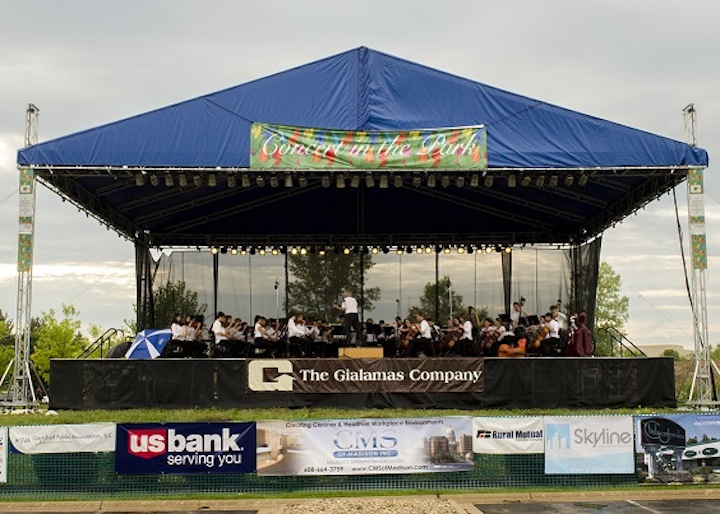
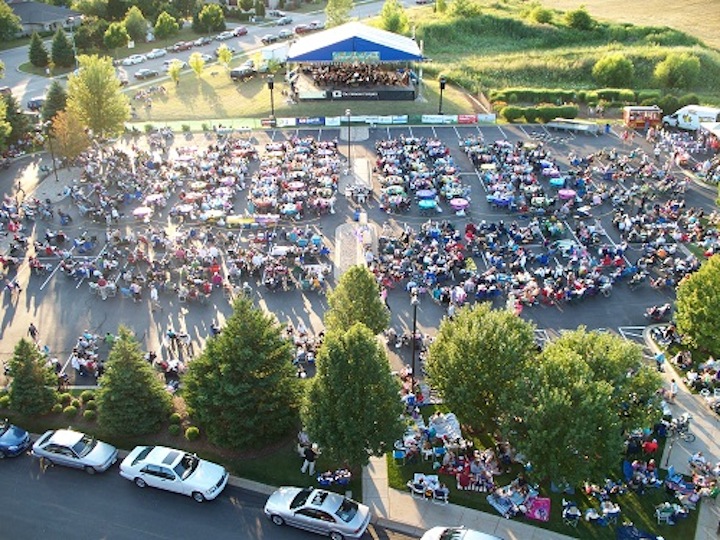
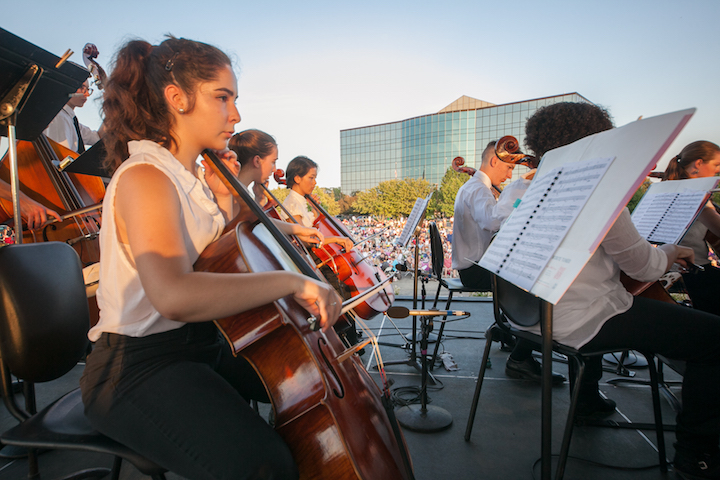
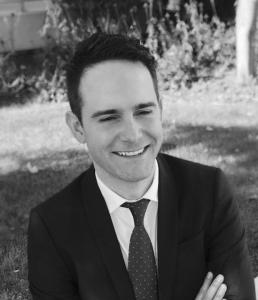
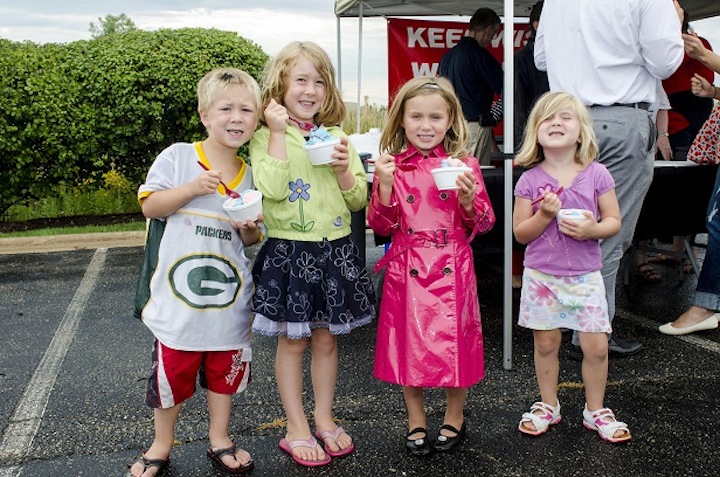

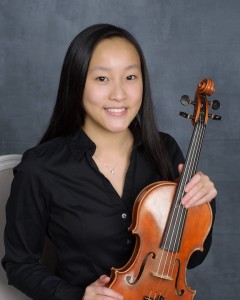
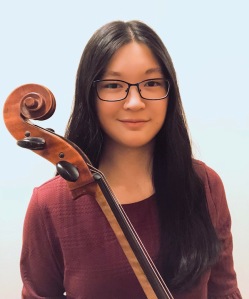





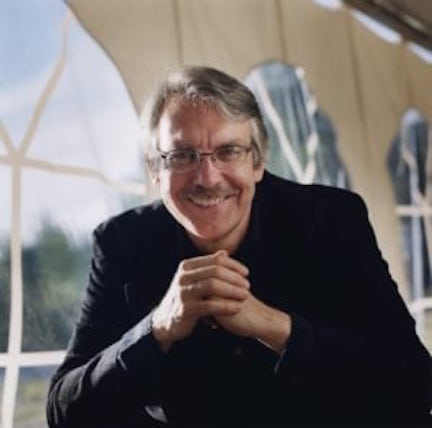

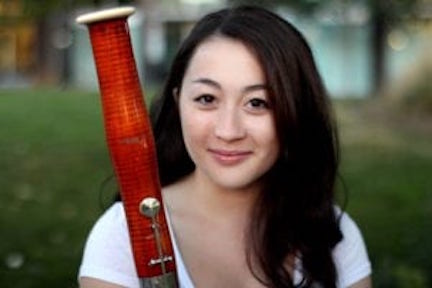





Classical music: Today is the Fourth of July. Here are two extended playlists of American masterpieces
1 Comment
PLEASE HELP THE EAR. IF YOU LIKE A CERTAIN BLOG POST, SPREAD THE WORD. FORWARD A LINK TO IT OR, SHARE IT or TAG IT (not just “Like” it) ON FACEBOOK. Performers can use the extra exposure to draw potential audience members to an event. And you might even attract new readers and subscribers to the blog.
By Jacob Stockinger
Today is Independence Day – the Fourth of July holiday.
It is a good occasion to listen to classical music by American composers (below), which you can hear much of the day on Wisconsin Public Radio.
But here are two other extended playlists of American classical music:
Here, thanks to a California radio station, is a list with complete performances of some of the best American masterpieces, including the “New World” Symphony by Antonin Dvorak, the “Afro-American” Symphony by William Grant Still (below), “Rhapsody in Blue” by George Gershwin and “Symphonic Dances from West Side Story” by Leonard Bernstein:
https://www.capradio.org/music/classical/2019/07/04/playlist-american-classical-music-for-your-fourth-of-july/
And thanks to Minnesota Public Radio, here are four hours of patriotic music for the holiday: https://www.classicalmpr.org/story/2018/06/29/celebrate-the-fourth-of-july-with-our-4hour-patriotic-classical-playlist
Finally, in the YouTube at the bottom is the “American” String Quartet by Antonin Dvorak (below), who summered in Spillville, Iowa. He loved hearing and tried to capture sounds of nature, including bird songs, traditional Black spirituals and music by Native Americans.
The Ear especially likes it because it is proof that just as Americans have been influenced by European composers, European composers, European composers have been influenced by American composers.
Do you have a special or favorite piece of classical music to help celebrate the Fourth of July?
What do you like about it?
Leave a comment with a YouTube link if possible?
The Ear wants to hear.
Share this:
Tags: #AaronCopland, #African-AmericanComposer, #African-AmericanMusic, #AfricanHeritage, #AmericanComposer, #AmericanPatriotism, #AmericanStringQuartet, #AmyBeach, #AntoninDvorak, #BirdSongs, #BlogPost, #BlogPosting, #ChamberMusic, #EuropeanComposer, #FacebookPost, #FacebookPosting, #FlorencePrice, #FourthofJuly, #IndependenceDay, #JacobStockinger, #JohnPhilipSousa, #JohnWilliams, #July4, #JulyFourth, #LeonardBernstein, #NativeAmerican, #NegroSpiritual, #NewWorldSymphony, #PianoConcero, #RhapsodyinBlue, #SamuelBarber, #StreamingService, #StringQuartet, #TheEar, #TheU.S., #UnitedStates, #VocalMusic, #WestSideStory, #WilliamGrantStill, #WisconsinPublicRadio, #YouTubevideo, Aaron Copland, African American, American, American String Quartet, Amy Beach, Antonín Dvořák, Arts, Barber, beach, bird songs, blog, blue, California, celebrate, Cello, Chamber music, choral music, Classical music, classicalmusic, comment, complete, composer, concerto, conductor, Copland, dances, day, Dvorak, Europe, European, Facebook, favorite, Florence Price, forward, Fourth of July, George Gershwin, georgegershwin, Gershwin, good, hear, Holiday, Independence Day, Independence Day (United States), influence, Iowa, Jacob Stockinger, John Philip Sousa, John Williams, July 4, Leonard Bernstein, like, link, list, Love, Madison, march, Minnesota, Music, Native American, Native American music, nature, new, New World Symphony, occasion, online, opera, Orchestra, patriotic, patriotism, performance, Piano, piece, playlist, post, posting, proof, Radio, rhapsody, Rhapsody in Blue, S., Samuel Barber, share, Sound, Sousa, special, spiritual, Spotify, Still, stream, String quartet, summer, symphony, tag, The Ear, today, U, United States, Violin, vocal music, West Side Story, Willian Grant Still, Wisconsin, wisconsin public radio, world, WPR, YouTube